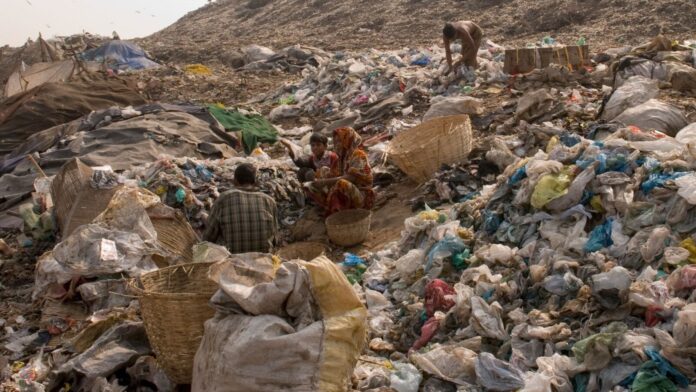All of which is taken by the thekedaars (contractors) they work for and sold to the recycling chains of different materials—plastics, bottles, metals and more. After the to-the-bone stripping, the worthless remnants form heaps that grow for months and even years.
The workers live amid rubbish heaps on the site. In structures made of waste metal and plastic sheets, and makeshift wooden frames. The two acres are divided among 12 thekedaars, all of whose workers live on their portion of the land.
These are entire families, not only men. The contractors have brought them here from distant parts of the country, usually from the vicinity of the towns that they themselves hail from. The 500 odd resident families do not pay any rent, but must work for their thekedaars.
For many workers, it’s a full family enterprise with their children working side-by-side. A family of five may earn up to ₹10,000 in a good month and ₹4,000 in a bad one, depending on how much territory they scrounge. Most cover 30-40 kilometres on foot every day.
If they don’t, because of illness, they lose that day’s earning. Weather conditions are just another obstacle—a downpour, blazing sun or freezing wind can’t stop them, just slow them down. Rain is particularly bad. It makes the waste messier, and its collection and sifting that much harder.
In journeys of dredging the city, day-after-day, year-after-year, those few who have been able to acquire a decrepit cart are in a different league, and even higher are those two or three who possess broken rickshaws. Both enable coverage of larger territory and collection of greater volumes.
But none can escape the basic peril of their trade—putting their hands in the bins, dumps and cesspools that we create across the city, with invisible shards of glass, corrosive chemicals, rotting organic material and worse. Hands with deep and shallow wounds, infected or not, and skin diseases are daily rewards.
The first thekedaar got hold of a piece of the site 15 years ago. Others came in over the next three or four years. The two acres are mired in land-title disputes. The state government and a religious institution are among the many claimants. Titles don’t matter on the ground in such disputes; control does. Those who control the land can’t sell or build on it without title papers, but they charge rent with impunity.
Jockeying for control is continuous. A couple of months ago, in the middle of the night, one of the claimants sent a platoon of thugs to get a portion vacated. Panic gripped the thekedaars of that portion and their workers. Their unlikely saviours turned out to be the local police, who thrashed the thugs and sent them packing. It is not clear why.
There is no water at the site. It is brought by tankers—to drink and wash. About 10-20% of family incomes are spent on water. There are no toilets, other than a few constructed by an NGO after much struggle. Those who rent the land do not want the faintest sign of a permanent settlement—so they do not permit construction of any sort. Resident families don’t have ration cards, having migrated from afar.
Rare are those who get any of the most basic government schemes. Getting children admitted to schools is hard. Even when the family is willing and the schools legally bound to, the latter find excuses not to admit them; they probably find the children dirty, smelly and wayward. There is one tree on the two acres—the only shade on that precipice of survival.
A few hundred metres away on tree-lined avenues and gleaming plazas are Munich-style bier-gartens and pubs, Japanese and Italian restaurants among scores of others, and four five-star hotels, all buzzing from dawn till late night. Hundreds of families spend ₹10,000 an evening on a single dinner outing, and people like us pay ₹12,000 for a room-night.
Remnants of waste from all this revelry add to the heaps close-by. If not those very heaps, then some other somewhere in our urban wasteland. Wherever you live in this country, with no effort beyond opening your gaze, you will find an identical twin of that site with the lone tree and 500 families living amid rubbish heaps.
Excavating our conscience buried at the bottom of those heaps is too much to hope for. We are unlikely to change our society structurally. It demands sustained collective and political action, apart from sacrifices and moral courage of the kind we seem incapable of today. When we regain some of that, we may change. Till then, we will live as we do and they will live as we let them.
Perhaps we can do some small things. Don’t call them ‘ragpickers’—they keep us clean. City and state officials should ensure that they receive the benefits of all government schemes; and others too who live in similar settlements and subsist on other trades. We should tolerate a few smelly children in school, or get them water to wash everyday. And be careful of how we dispose shards of glass and jagged metal, so that a child’s hand isn’t hurt. At least that much.
#Spare #thought #people #live #heaps #urban #garbage
